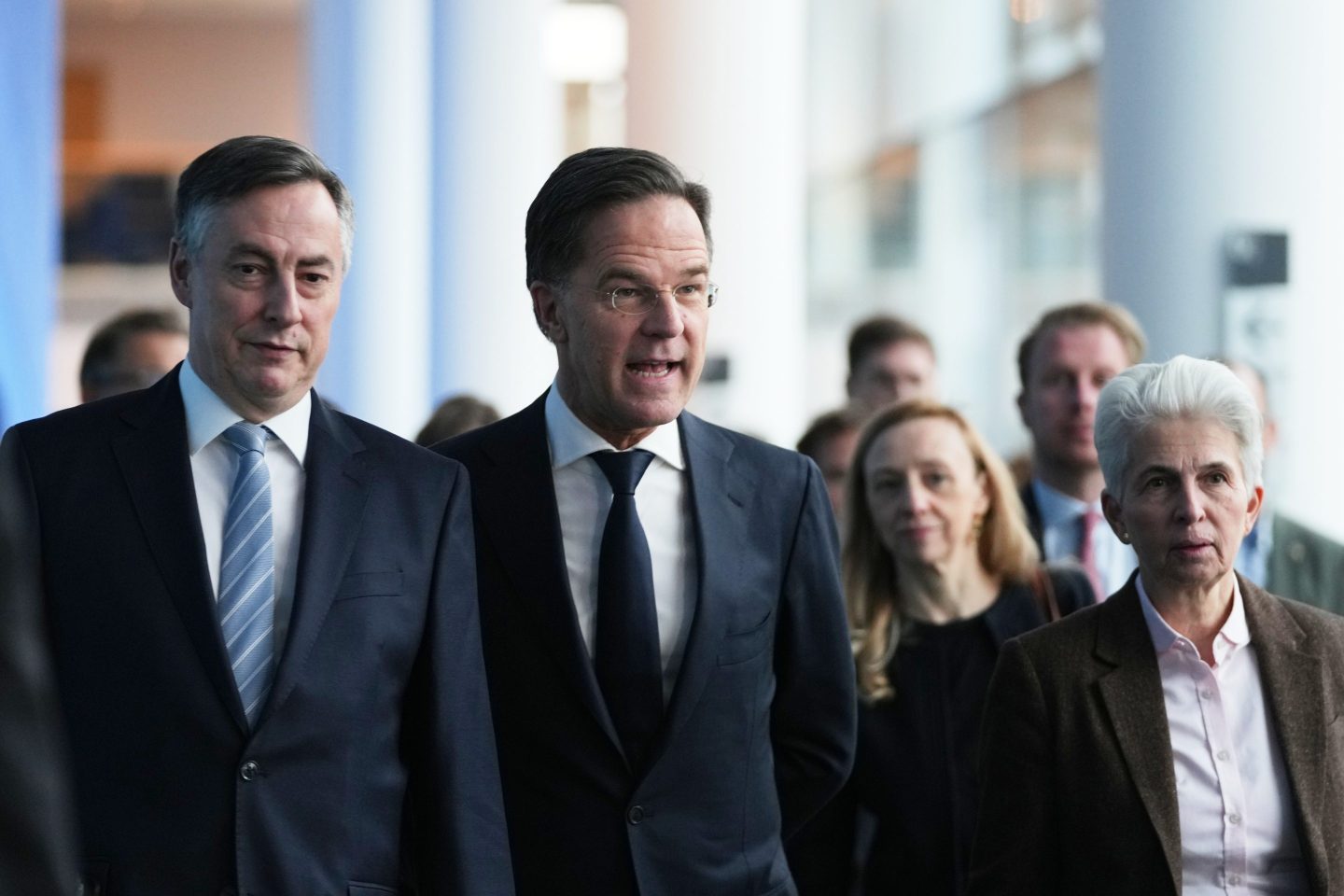Shortly after Russian tanks rolled into Ukraine in late February, farmers half a world away felt the impact. Already high food commodity prices, as measured by the UN’s Food and Agriculture Organization (FAO), soared to record levels. The price tags for everything from potash to wheat to soy took off.
The war was the “catastrophe on top of the catastrophe,” said Svein Tore Holsether, CEO of the fertilizer giant Yara International, who was among the first to warn that Russia’s war on Ukraine would lead to a global food crisis.
The war in Ukraine also triggered a big rethink across Big Ag, and the seeds of a transformation can be found in some of the emerging corners of the food sector.
One such corner is at a gleaming new factory on the outskirts of the port city of Bergen op Zoom, home to the Dutch ag tech startup Protix.
Not long after the Kremlin’s invasion of Ukraine began, the attention being paid to Protix took off. The company began to receive an increasing numbers of interested calls from both companies and governments, Protix founder and CEO Kees Aarts told Coins2Day. One call that especially caught his attention came from the government of a European neighbor. “The country wants to reduce its import dependency,” he says, declining to say more until a deal is signed.
The prospective customers’ big ask: insects.

“Insects to feed the world”
Protix is one of a small number of startups that each year breed millions and millions of Hermetia illucens, or the black soldier fly, a sleek, winged critter common throughout Eurasia and North America.
Entomologists have long been drawn to the black soldier fly (BSF) because their young are prodigious decomposers of food waste and can convert our mountains of discarded scraps into proteins and vital soil nutrients. More than a decade ago, scientists at FAO saw in BSF a species that held a key to solving two huge issues confronting the planet: tackling food waste, and offering a new protein food source that could help keep billions from starving.
In May 2014, the UN body called on the small band of BSF researchers and green-ag entrepreneurs—among them were Protix, the American firm EnviroFlight (since sold to Darling Ingredients), Enterra Feed of Canada, and AgriProtein Technologies from South Africa—to gather on the campus of Wageningen University in The Netherlands to try and jumpstart an industry around BSF. The name of the event gave away FAO’s planet-sized ambitions: “Insects to feed the world.”
Intrigued, your correspondent traveled to the event, where I met many of the startups, including Protix. It’s also where I munched on crickets mixed into a green salad (not bad!) And sampled a few pinches of black soldier fly powder meal (not my thing). But mostly we talked about the challenges of breeding insects at an industrial scale—the sweet spot is harvesting the bug’s larval offspring, and converting that mass of wriggling eaters into the basic ingredients for livestock feed or an all-natural pet food (more on how that’s done below)—and convincing regulators it was safe for human and animal consumption.

EU green light
After years of debate and lobbying, the sector finally had its moment to savor when the European Union last summer gave the green light to farmers, allowing them to feed insects to their chickens and piglets. (Fish farmers were the first to win approval, a few years earlier.) The business impact was sudden.
According to Aarts, last year consumers bought €75 million worth of Protix’s insect-based products across the 15 countries it operates in. (The biggest chunk of the business went to pet food suppliers, but the livestock feed portion is now growing quickly.) That’s a tiny piece of the half-trillion-dollar global animal feed market, but the insect-feed sector is expected to explode now that regulators around the world are beginning to see the light. Researchers at the Dutch financial services firm Rabobank expect industry demand for insect protein to grow 50-fold to a half-million metric tons per year by the end of the decade.
Rabobank’s Gorjan Nikolik, one of the authors of the bank’s report on the insect feed market, says soaring feed ingredient prices—which were compounded by the war in Ukraine—could easily become a great accelerant to push insect feed more into the mainstream. The other issue, he says, is the need for local sourcing: “With disruptions of price, disruptions of war, do you really want to depend on something that comes from far away, like in Ukraine?”
Aarts confirms that’s a discussion he’s hearing, but he also takes a longer view. “What are you going to do when the war is over?” He asks rhetorically. He would prefer to focus on how society is going to adapt to the more enduring issue of climate change and its impact on the global food supply. “The structural issue there is rising temperatures, volatile weather patterns, and therefore more unpredictable crop productivity.”
“If the uncertainty of agriculture outputs goes up,” he continues, “the demand for innovative [and] more predictable sources goes up.” That’s why his phone is ringing off the hook these days, he says. Farmers and farm ministries are looking for more local and dependable food commodities. Nothing is more local and dependable than insects, Aarts feels.
How it works
At Protix’s factory, the company has built a massive zero-waste vertical farming operation. The black soldier flies are bred in temperature-controlled mating chambers. The offspring—the eggs—are then collected and transported to separate chambers where they fatten up on plant-based waste products supplied from the local community. Once the larvae reach a certain size, they are harvested and converted into meal or liquid.
Protix calculates it can produce the equivalent of 10,000 tons of protein per hectare per year, a fraction of the land Big Ag requires to grow and process the crops and other protein sources that go into feeding animals.
In February, before the war, Protix announced a €50 million funding round to finance its international push. The objective for Protix and others in the insect-protein space is to build vertical farms in markets around the world where they can take food waste from urban centers and convert it into protein for animals on nearby farms.
The competition
Venture funding has been raining down on this young sector. In October 2020, the French insect-farming startup Ÿnsect generated big headlines when it closed a $372 million round of funding. Among the investors was the actor Robert Downey Jr. And his investment vehicle FootPrint Coalition. Ÿnsect differs in that its bug of choice is the Tenebrio Molitor beetle.
In our conversation this month, Aarts, a former McKinsey consultant, preferred to talk about market potential rather than funding rounds. “I think it’s fair to say we shouldn’t evaluate the market maturity on the number of LinkedIn messages and press releases,” he told me in a thinly veiled jab at his competitors. Back in 2014, when I first started covering this startup sector, I learned this isn’t the most collegial corner of the startup world. Apparently, that’s still the case.
Aarts quickly changed the subject—to his customers, which are increasingly opting for insect-based nutrients over conventional feed ingredients such as palm kernel or soybean oil, and not just because the latter are often sourced from far-away locations like South America or Southeast Asia.
One major customer is the Dutch agriculture feed giant, Coppens Diervoeding.
With Protix’s help, in 2016 Coppens developed an insect-based oil to feed piglets. Early trials showed the oil resulted in boosting the animals’ immune system, lowering the incidence of diarrhea and even mortality rates. A second product proved effective in nearly eliminating two debilitating bacteria that commonly affect the health of piglets, which meant the young animals could be given fewer antibiotics in the crucial early years of growth.
Last summer, when the EU finally gave full approval to feed pigs and chickens the insect feed, the company hailed the move as a victory for farmers. The insect-feed, said CEO Hendrik de For, “is a key part of our solution to contribute to a more sustainable livestock production.”
Rabobank’s Nikolik sees insect-based feed gaining market share on nutritional and environmental grounds. Ag companies are increasingly interested in raising the quality of the animals’ diet, and, at the same time, telling the market they’re sourcing the ingredients locally, to fulfill their net zero goals.
Insects, he says, are “an ingredient that will provide good performance (in raising livestock), and provide sustainability credentials.”
Each week , Coins2Day covers the world of innovation in Breakthrough. You can read previous Breakthrough columns here.











